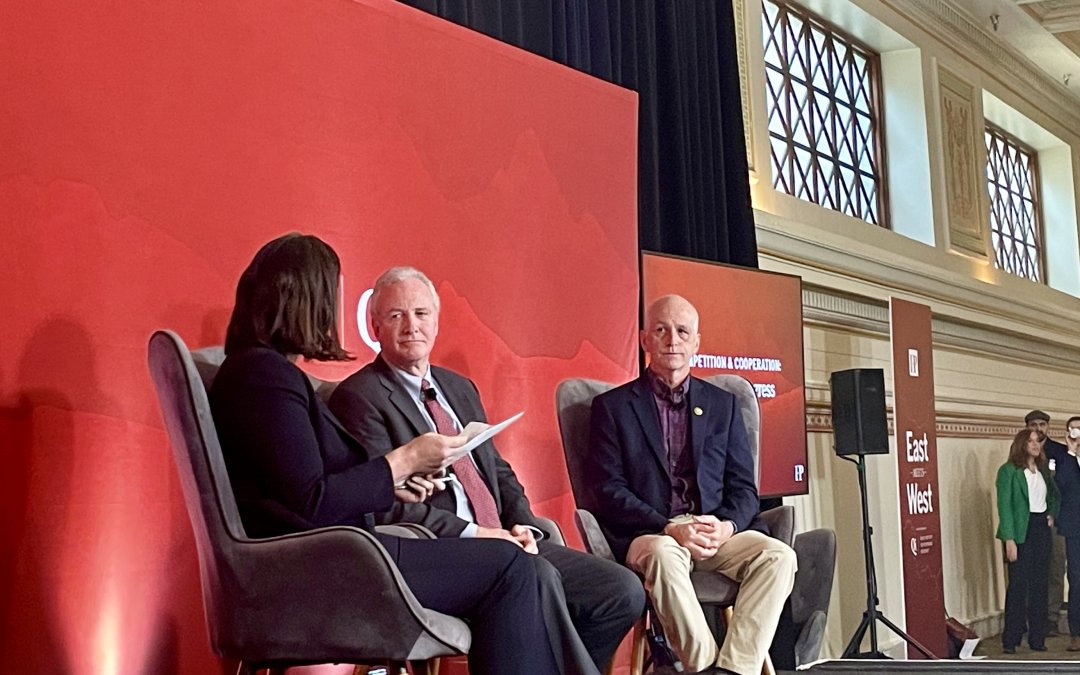WASHINGTON – Ahead of the first meeting between President Joe Biden and President Xi Jinping of China since November 2022, legislators, economic officials and China experts were optimistic about reopening communication channels with China but urged the U.S. to rethink economic and diplomatic relationship between the world’s two largest economies.
“There’s broad bipartisan agreement that we need to be much more focused on how we deal with this strategic competition,” Sen. Chris Van Hollen (D-Md.) said in a panel discussion Thursday. “That said, those who say we shouldn’t be talking to China, we shouldn’t be traveling to China, are taking the wrong path.”
The discussion, hosted by Foreign Policy and the Quincy Institute, came ahead of the Asia-Pacific Economic Cooperation summit in San Francisco next week. Biden and Xi are expected to meet on the sidelines in the first face-to-face interaction between the two leaders since the G20 summit in Bali, Indonesia.
Several senior Biden administration officials have traveled to China to resume diplomatic dialogues between the two countries in the months leading up to the summit. In June, Secretary of State Antony Blinken met with Xi and top foreign affairs officials in Beijing. His trip was followed by Treasury and Commerce Secretaries Janet Yellen and Gina Raimondo.
In exchange, the U.S. has received China’s foreign minister Wang Yi. The visit was widely seen to have paved the way for the Biden-Xi meeting.
The meeting between the two leaders will come at a critical time for the economic and trade relations between the countries. The Chinese government has made historic investments into the country’s technology sector, specifically the semiconductor industry, that has heightened tensions with the U.S.
Separately, China faces a high youth unemployment rate at over 20 percent, a crisis in its property sector and a 26-year low in foreign investment, said Joyce Chang, the chair of global research at J.P. Morgan.
Because of the volatile state of the Chinese economy, American companies are increasingly reassessing their businesses and investments in China, said Kimberly Glas, a commissioner on the U.S.-China Economic and Security Review Commission.
But, Glas emphasized that the U.S. does not seek to decouple with the Chinese economy and instead pushed for the softer term of “de-risking.”
“It’s not a transparent system,” she said. “I think companies are understanding the opaqueness of that structure actually put some of their assets at risk.”
In the technological brinksmanship with China, the U.S. has enacted a series of outbound investment restrictions and export controls on semiconductors and their manufacturing equipment in an effort to block China from accessing the most cutting-edge technologies in the sector.
During the panel discussion, Glas defended the Biden administration’s tightening of export controls. She noted that China has also imposed restrictions on the export of rare earth metals, such as gallium and germanium, that are crucial to semiconductor manufacturing. Restrictions like these underline the need for the U.S. to deploy policy tools at its disposal to protect national interests.
Rep. Adam Smith (D-Wash.) also backed a strategy of de-risking critical industries while maintaining channels of communication with China.
“All this overheated rhetoric about how you can’t even talk to China because that just shows you’re weak is really troubling,” Smith said. “We need to engage in a smart, intelligent way and be competitive against that threat.”
Smith and Van Hollen took the opportunity to urge Congress to send military assistance to Ukraine and criticize the Republican presidential candidates’ foreign policy platforms for being “inconsistent.”
“If we don’t support military assistance for Ukraine, we will send a very bad message not just to … the NATO alliance, but to our partners in East Asia, Japan, South Korea, others and a very bad signal to Xi, who has one eye on Taiwan and another eye on how we are responding,” Van Hollen said.
Against the backdrop of China’s economic woes, military conflicts in Eastern Europe and the Middle East, and a U.S. presidential election quickly approaching, the APEC summit has the potential to improve the U.S.-China relation, said Bonnie Glaser, the managing director of the German Marshall Fund’s Indo-Pacific program.
Although the summit is unlikely to change policy, Glaser said she expects the two sides to resume communication between law enforcement agencies and militaries, halted since then-Speaker Nancy Pelosi’s (D-Calif.) visit to Taiwan in 2022.
“There is interest on both sides in managing the relationship and preventing it from spiraling out of control,” Glaser said. “I think both sides for their own reasons, which are different, have a particular interest at this time in getting this stabilization process to stick.”

